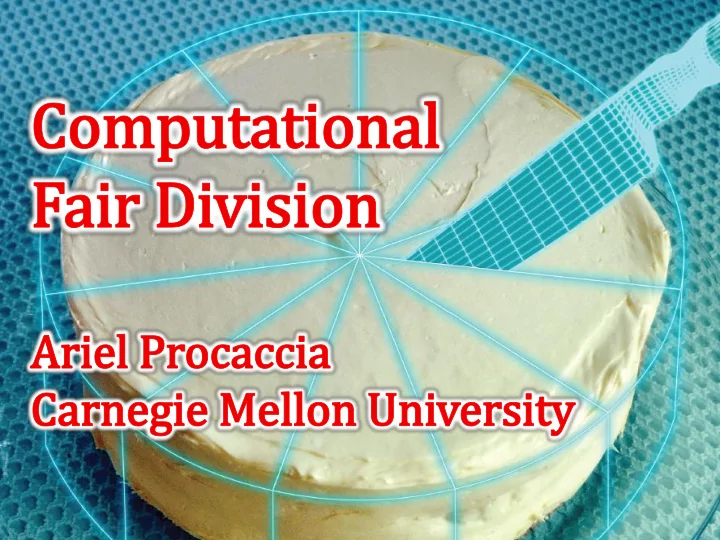

O VERVIEW Rent Division Computationally efficient algorithms for assigning rooms and dividing rent Indivisible Goods A new, approximate notion of fairness and its application in Spliddit Classroom Allocation Leximin in the real world: properties, optimization, and implementation
O VERVIEW Rent Division Computationally efficient algorithms for assigning rooms and dividing rent Indivisible Goods A new “computational” notion of fairness and its application in Spliddit Classroom Allocation Leximin in the real world: properties, optimization, implementation
T HE HE W HIN INING P HILOSOPHERS P ROBLEM Nir Ben Moshe Naomi Sender Ariel Procaccia
Total rent: Room 1 $10 Room 2 Room 3
E NVY -F REE R ENT D IVISION • Theorem [Sevensson 1983]: An envy-free solution always exists • Theorem [Aragones 1995]: An envy-free solution can be computed in polynomial time
Total rent: Room 1 $3 Room 2 Room 3
E NVY -F REE R ENT D IVISION • Theorem [Sevensson 1983]: An envy-free solution always exists • Theorem [Aragones 1995]: An envy-free solution can be computed in polynomial time • Theorem [Gal, Mash, P, Zick 2015]: A solution that maximizes the minimum utility subject to envy-freeness can be found in polynomial time
O VERVIEW Rent Division Computationally efficient algorithms for assigning rooms and dividing rent Indivisible Goods A new “computational” notion of fairness and its application in Spliddit Classroom Allocation Leximin in the real world: properties, optimization, implementation
I NDIVISIBLE G OODS Assume: additive valuations
• EF is infeasible ⇒ random values? • For each good , draw values 𝑊 1 , … , 𝑊 𝑜 () from a distribution over 0,1 𝑜 • Theorem [Dickerson et al., 2014]: Under mild technical assumptions, Min value of 𝑛 such that 99% of if 𝑛 = Ω(𝑜 ⋅ log𝑜) then instances admit an EF allocation an EF allocation exists w.h.p. as 𝑛 → ∞
M AXIMIN S HARE G UARANTEE Total: Total: Total: $30 $50 $20 $30 $50 $2 $5 $5 $3 $5 $2 $10 $5 $20 $20 $3 $40 Total: Total: Total: $30 $30 $40
• Maximin share (MMS) guarantee [Budish 2011] of player 𝑗 : 𝑌 1 ,…,𝑌 𝑜 min max 𝑊 𝑗 (𝑌 𝑘 ) 𝑘 • Theorem [P & Wang 2014]: ∀𝑜 ≥ 3 there exist additive valuation functions that do not admit an MMS allocation
C OUNTEREXAMPLE FOR 𝑜 = 3
C OUNTEREXAMPLE FOR 𝑜 = 3 × 10 6 × 10 3 + +
• Maximin share (MMS) guarantee [Budish 2011] of player 𝑗 : 𝑌 1 ,…,𝑌 𝑜 min max 𝑊 𝑗 (𝑌 𝑘 ) 𝑘 • Theorem [P & Wang 2014]: ∀𝑜 ≥ 3 there exist additive valuation functions that do not admit an MMS allocation • Theorem [P & Wang 2014]: It is always possible to guarantee each player 2/3 of his MMS guarantee (in poly time for constant 𝑜 )
O VERVIEW Rent Division Computationally efficient algorithms for assigning rooms and dividing rent Indivisible Goods A new “computational” notion of fairness and its application in Spliddit Classroom Allocation Leximin in the real world: properties, optimization, implementation
Hervé Moulin “… the reward of helping people who have a real fair division problem by explaining our solutions, is that they in return pose interesting and difficult new questions, food for our thoughts. … It could be a goldmine of ideas, as well as a costly proposition if there are too many questions!”
“… public school facilities should be shared fairly among all public school pupils, including those in charter schools.”
I object, your honor — the method is provably fair!
O UR UR APPROACH • Facilities have capacities • Players have demands • Preferences are dichotomous • Starting point: the Leximin Mechanism [Bogomolnaia and Moulin 2004]
T HE HE L EXIMIN M ECHANISM 1 1 2 2 : 1 1 1 1 2 2 2
T HE HE L EXIMIN M ECHANISM 1 1 1 2 4 4 : 1 1 3 3 2 2 4 4
• Theorem [Kurokawa et al. 2015]: The leximin mechanism satisfies proportionality, envy-freeness, Pareto efficiency, and group strategyproofness • We actually prove this in a much more general framework • Theorem [Kurokawa et al. 2015]: The expected number of units allocated by the leximin mechanism 1/4 -approximates the maximum number of units that can be allocated simultaneously
B IBLIOGRAPHY • Procaccia. Cake Cutting: Not Just Child’s Play. Communications of the ACM 2013. • Dickerson, Goldman, Karp, Procaccia, and Sandholm. The Computational Rise and Fall of Fairness. AAAI 2014. • Procaccia and Wang. Fair Enough: Guaranteeing Approximate Maximin Shares. EC 2014. • Kurokawa, Procaccia, and Shah. Leximin Allocations in the Real World. EC 2015.
Recommend
More recommend